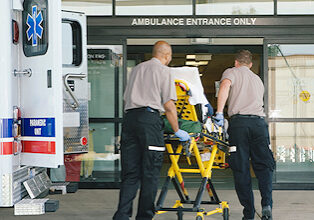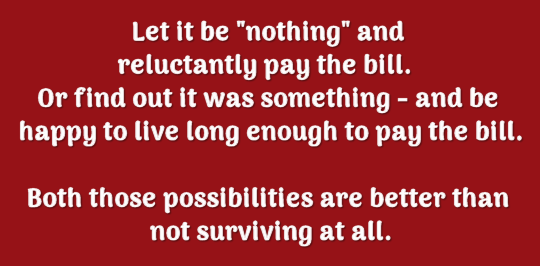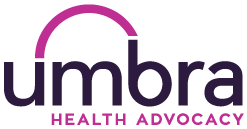The Folly of Driving to the ER

Hugh, a gentleman of about 68 years, lived alone. Hugh wasn't feeling well. It was just a general feeling that something - who knows what? - just wasn't right.
After a short while, Hugh walked over to see Phil, his next door neighbor. Phil agreed to drive Hugh to the Emergency Room.
It took them about 30 minutes to get there. Hugh signed in, and together he and Phil sat down in the waiting room. Within 15 minutes, Hugh keeled over, out of his chair, and onto the floor. He had "coded."
Nurses and doctors immediately rushed over with the "crash cart" to jump start Hugh's heart; they brought him back from the brink of death. He was immediately admitted to the hospital and had surgery that afternoon...
But Hugh died a few days later, never having regained consciousness from the attack he had suffered in the ER.
Hugh was my friend. He was my neighbor. He left behind his wonderful dog, his adult children (who all lived out of town and we didn't know them), and many of us who just adored him.
Now we are all angry at Phil.
You might wonder why we would be angry at Phil. Afterall, Hugh asked Phil to drive him to the ER. What a neighborly thing to do - right?
No. Wrong. Absolutely WRONG!
The thing is - Phil has had two heart attacks himself. He should have known better than to drive Hugh to the hospital himself. He should have insisted on dialing 9-1-1. And that is why we are angry at Phil.
When you, or someone you care about has odd symptoms that could involve something life-threatening, never drive them to the ER yourself.
Let's suppose Phil had insisted on dialing 9-1-1. Let's even suppose Hugh had dialed 9-1-1 himself. The EMTs would have arrived very quickly, and realized immediately that Hugh was in the midst of a heart attack, or cardiac arrest. They would have treated him immediately, stabilized him, and then transported him to the hospital. There would not have been that delay in getting treatment which was then too little too late. It's entirely possible Hugh would have survived and we would all still have our friend among us.
I know... you're thinking "Yeah, but what if it's nothing? How embarrassing and possibly expensive that would be!"
That's very true. That's your choice. Let it be "nothing" and reluctantly pay the bill. Or find out it was something - and be happy to live long enough to pay the bill.
I know which one I would choose! Both those possibilities are better than not surviving at all.

There are so many people, especially those of us who are a little older, who know whether we are at risk to suffer a heart problem, or a stroke, or some sort of episode that can ride that line between life and death. Every one of us needs to talk to our loved ones and neighbors to be sure they know to dial 9-1-1.
If you aren't sure if you are one of those folks who needs to know the difference, contact a health advocate to discuss it further. He or she won't make decisions for you; instead they will help you walk through scenarios yourself so your friends or loved ones will know what to do - or so you will know what to do for them.
Don't risk death! Dial 9-1-1. The life you save may be your loved one's - or your own.
Find a Health / Patient Advocate or Navigator
Learn more about The Alliance of Professional Health Advocates
